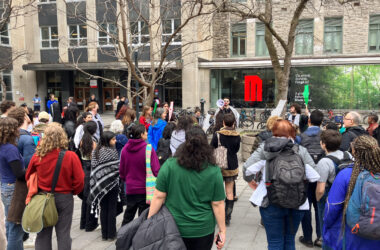On the 30th anniversary of the decriminalization of abortion in Canada, the McGill Institute for Gender, Sexuality and Feminist Studies (IGSF) organized a two-day bilingual conference, Abortion Beyond Bounds 2018, to discuss the continuously-changing global landscape of access to abortion. The conference, which featured a series of student and expert panels, revolved around the importance of having control over abortion decisions. The speakers considered how persistent barriers to global access contrast the increased availability of information and resources thanks to new technologies.
The first day of the conference consisted of student panels, providing graduate student researchers from across Canada the opportunity to present their work. The panel “Voice and Choice: First-Person Narratives of Abortion Experiences in Canada” focused on people’s experiences with self-managed abortion, meaning when a woman chooses to perform her own abortion outside of a medical setting. Contrasting with the independent notion of self-managed abortions, Sarah McLeod, a graduate student at Acadia University, presented a case study on Acadia Pregnancy Support (APS), an anti-choice organization on her campus. Despite advertising themselves as a non-judgmental counselling service with peer support and access to resources, this Christian organization circulated misleading and biased information in addition to resorting to shame and scare tactics to discourage abortion. APS eventually lost its club status and was expelled from the Acadia Students’ Union building for failing to have enough members. McLeod concluded her presentation with her opinion on the organization’s activities.
“Should anti-choice organizations be allowed to operate as ‘pregnancy support’ on university campuses?” McLeod asked. “I would say no.”
With regard to Canada legalizing the self-administered abortion pill mifepristone in 2016, the panel “Trust Women: Current Perspectives on the Safety of Medication Abortion” sought to assess the current clinical scene. Student research focused on expanding the possibilities of existing reproductive health methods to provide women with more autonomy in the process of abortion. Daniela Spagnuolo, a policy intern at Association of Municipalities of Ontario, conveyed the importance of her group’s research in promoting self-managed abortions.
“There needs to be change in the way people across Canada access Mifegymiso [the brand name for mifepristone],” Spagnuolo said. “That it is available in this country is not enough. We need to actively remove barriers to access, provide evidence-based information, and trust users to know their bodies and make their own decisions about abortion options.”
Parisa Sharifi, a research assistant at the University of Toronto, stressed the importance of presenting research findings in the field to a public audience.
“It’s been really important for us to present to the public to hear questions and see what we missed,” Sharifi said. “Especially with this conference where everyone works on or is affected by this research, it is important to hear from the audience.”
The second day of the conference brought together academics, activists, and artists to participate in a series of expert panels on self-managed abortion. Jennifer Fishman, associate professor at McGill and co-organizer of the conference, expressed the importance of discussing abortion through the lens of various institutions.
“Institutions’ primary motivation is carving out a space to consider how networks, such as clinical and legal networks, are finding ways to expand access,” Fishman said.
Joanna Erdman, associate professor in Health Law and Policy at the Schulich School of Law at Dalhousie University, outlined the common goal of the experts present at the conference.
“The real challenge is to think about whether we can capture the concept [of expanding the availability of abortion] without killing it, to recognize ideas of love, compassion and self-care, and to think about whether our institutions are even capable of honouring that,” Erdman said.









